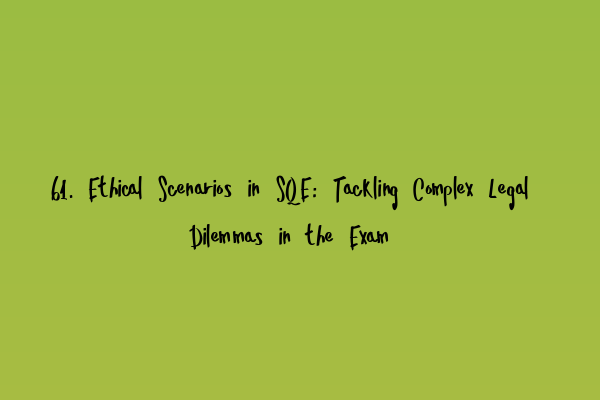61. Ethical Scenarios in SQE: Tackling Complex Legal Dilemmas in the Exam
When preparing for the Solicitors Qualifying Examination (SQE), it is crucial to not only have a solid understanding of the law but also to be able to navigate ethical dilemmas that may arise in practice. The SQE exams assess your ability to apply legal knowledge and skills in real-world scenarios, and ethical considerations are an integral part of that assessment.
In this article, we will explore some common ethical scenarios that may be presented in the SQE exams and discuss strategies for handling these complex legal dilemmas.
1. Conflict of Interest
One of the most common ethical challenges faced by solicitors is the conflict of interest. This occurs when a solicitor’s duty to act in the best interest of a client conflicts with the interests of another client or a third party.
When encountering a conflict of interest scenario in the SQE exam, it is crucial to identify the conflicting interests, assess the potential impact on each party involved, and consider possible courses of action. Remember to refer to the relevant rules and regulations, such as the Solicitors Regulation Authority (SRA) Code of Conduct, when determining the appropriate response.
If you need additional practice in tackling conflict of interest scenarios, consider trying out some SQE 1 practice exam questions or SQE 1 practice mocks FLK1 FLK2 to enhance your skills.
2. Confidentiality
Another ethical consideration that solicitors must navigate is the duty of confidentiality. Solicitors are bound to keep client information confidential unless required by law or under specific exceptions outlined in the SRA Code of Conduct.
In the SQE exam, you may encounter scenarios where you have to determine when and how to disclose confidential information. It is essential to understand the limits of confidentiality and how to balance your duty to the client with other obligations, such as preventing harm or upholding the justice system’s integrity.
For additional preparation on confidentiality issues, consider taking some SQE 2 preparation courses to ensure you are well-versed in the rules and principles surrounding confidentiality.
3. Professional Integrity
Professional integrity is a fundamental aspect of legal practice. Solicitors are expected to act honestly, ethically, and with utmost professionalism. In the SQE exams, you can expect scenarios that test your understanding of professional integrity, including situations where you may face pressure to compromise ethical standards.
When confronted with dilemmas related to professional integrity, it is crucial to remember your obligations as a solicitor and to prioritize the interests of your clients and the legal system. Familiarize yourself with the SQE 1 preparation courses to ensure you are well-equipped to handle these challenging scenarios.
4. Client Relations
Building and maintaining effective client relationships is vital to the practice of law. Solicitors must communicate clearly, honestly, and with respect to their clients’ needs and expectations. The SQE exams may include scenarios that test your ability to navigate complex client relations issues.
When facing such scenarios, consider the principles of effective communication, client care, and managing client expectations. You may need to balance your duty to the client with other legal and ethical considerations, such as managing time and resources. Reviewing the SRA Code of Conduct and taking SQE preparation courses can help you refine your skills in handling client relations.
Conclusion
The SQE exams require not only sound legal knowledge but also a strong understanding of ethical principles and the ability to apply them in complex scenarios. By practicing and familiarizing yourself with common ethical dilemmas, you can confidently tackle these challenges in the exam.
Remember to refer to the relevant rules and regulations, such as the SRA Code of Conduct, and consider additional practice resources, such as SQE 1 practice exam questions and SQE 1 practice mocks FLK1 FLK2, to enhance your skills in addressing ethical scenarios.
For more information about the SQE exams and important dates, please refer to the SRA SQE exam dates page.
